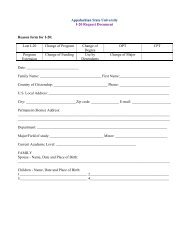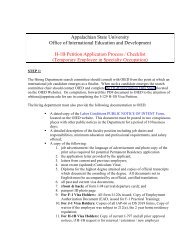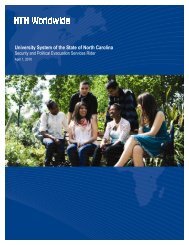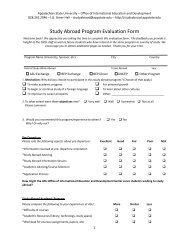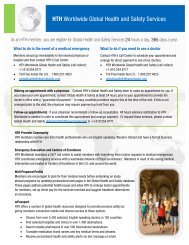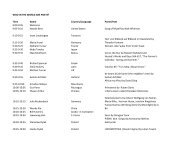Program Leader Handbook - International Education and ...
Program Leader Handbook - International Education and ...
Program Leader Handbook - International Education and ...
You also want an ePaper? Increase the reach of your titles
YUMPU automatically turns print PDFs into web optimized ePapers that Google loves.
Appalachian Overseas <strong>Education</strong> <strong>Program</strong>s <strong>Program</strong> <strong>Leader</strong> <strong>H<strong>and</strong>book</strong><br />
2. <strong>Program</strong> Registration with the U.S. Consulate or Embassy<br />
Prior to departure, please enroll your program in the Smart Traveler Enrollment <strong>Program</strong> or STEP, formerly known as<br />
“Travel Registration” or “Registration with Embassies”, which is available on the U.S. Department of State webpage at:<br />
https://travelregistration.state.gov/ibrs/ui/, if you have not already done so. Make sure you create an Organization account,<br />
as opposed to an Individual account, as you will be entering information on the behalf of all program leaders <strong>and</strong> participants.<br />
The travel <strong>and</strong> contact information you enter into STEP will make it easier for consular officers in U.S. embassies <strong>and</strong> consulates<br />
around the world to contact the program during an emergency - including in situations where families or OIED in the<br />
U.S. may have problems trying to contact you with important news, or in the case of emergencies such as natural disasters.<br />
You only need to sign up with STEP once (you will need to create the account with a user ID <strong>and</strong> password), <strong>and</strong> then you can<br />
add <strong>and</strong> delete trips from your account based on your current travel plans.<br />
Please know that in accordance with the Privacy Act, information on your program’s welfare <strong>and</strong> whereabouts will not be released<br />
to others by the State Department without your expressed authorization.<br />
3. Logistical Information to Gather Prior to Departure<br />
Prior to departure, you should collect the following information <strong>and</strong> have it ready to take with you on the program:<br />
31<br />
<br />
<br />
<br />
<br />
<br />
<br />
Telephone number <strong>and</strong> address of the U.S. Embassy or Consulate nearest the program site.<br />
You will need to register the group there before arrival (see last section).<br />
Name, address, <strong>and</strong> telephone number of an English-speaking doctor at or near the program site(s).<br />
Name, address, <strong>and</strong> telephone number of nearest large hospital that provides urgent/emergency care.<br />
Name, address, <strong>and</strong> telephone number of local police.<br />
Directions for direct AND operator-assisted dialing to the U.S. from site, including access codes <strong>and</strong><br />
acceptability of coins/telephone cards/calling cards.<br />
Options for a cell phone number overseas as you are required to secure a cell phone number where you can be reached<br />
abroad 24/7. If your program site is located in a remote area, you may have to look into renting a satellite phone.<br />
Please note that much of the information listed above can be obtained from the U.S. Embassy or Consulate or printed from the<br />
the HTH Medical Insurance website (See the Important Contacts section on pages 7-8). The HTH website is available to any<br />
person (staff <strong>and</strong> students) covered by HTH insurance, <strong>and</strong> offers an option to print “emergency cards” that include local doctors,<br />
hospitals, <strong>and</strong> emergency numbers. A secure login to the site is required. If you do not have your login information for<br />
this website prior to departure, please contact OIED for assistance.<br />
4. Emergency Contact Cards<br />
OIED strongly advises program leaders to create wallet-size “emergency contact cards” for participants to carry with them at<br />
all times. The cards should include phone numbers <strong>and</strong> addresses (if pertinent) for the following contacts, along with the dialing<br />
information (all digits) required to call in-country <strong>and</strong> overseas:<br />
- OIED <strong>and</strong> Appalachian police numbers<br />
- local equivalent of 911, local police, local medical emergency services<br />
- local US embassy or consulate<br />
- program leader’s onsite contact information<br />
- local housing/hotel contact information<br />
Revision Date 5/8/13<br />
507_AOEP_<strong>Leader</strong><strong>H<strong>and</strong>book</strong>



